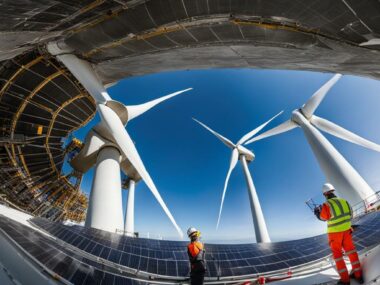What do public utilities jobs do? Public utilities jobs refer to a range of positions that are essential to the provision of basic services such as electricity, gas, water, and telecommunications to the public.
These jobs are typically found in government agencies or private companies that are regulated by the government.
If you are considering a career in public utilities, one of the key factors you may be curious about is the salary you can expect to earn.
The pay for public utilities jobs can vary depending on a range of factors, including the specific job you are applying for, your level of experience, and your geographic location.
In this article, we will explore what public utilities jobs typically pay and provide some insights to help you better understand the salary expectations for different roles in this industry.
Also Read:
Is Packaged Foods a Good Career Path?
What Do Consumer Non-Durables Jobs Pay?
What Do Public Utilities Jobs Pay?
Public utilities jobs pay can vary depending on factors such as job type, experience, and location.
Entry-level positions such as customer service representatives and meter readers typically earn lower salaries, while more technical roles such as engineers and analysts command higher salaries.
Mid-level management roles such as supervisors and managers fall somewhere in between.
Public utilities salaries are also affected by regional cost-of-living variations, with salaries in larger cities typically being higher.
Overall, public utilities jobs offer competitive salaries with opportunities for growth and advancement.
However, it’s important to research the specific job you are interested in and negotiate your salary to ensure you are being fairly compensated.
Factors Affecting Salaries in Public Utilities
Salaries in public utilities are influenced by several factors. One of the most significant factors is job type or position.
For instance, entry-level positions such as customer service representatives typically earn lower salaries compared to more technical positions such as engineers and analysts.
Additionally, experience level and education can impact salaries, with those having more experience and advanced degrees earning higher salaries.
Geographic location is another factor that affects public utilities salaries. Salaries tend to be higher in larger cities where the cost of living is generally higher.
Finally, the size of the company, the state of the economy, and industry competition can also impact public utilities salaries.
Comparison of Public Utilities Salaries to Other Industries
When it comes to salaries, public utilities jobs are generally competitive compared to other industries.
According to the Bureau of Labor Statistics, as of May 2020, the median annual wage for all occupations was $41,950, while the median annual wage for utilities workers was $81,520.
When compared to other industries, such as finance, healthcare, or technology, public utilities salaries can be similar or slightly lower on average.
However, the benefits of working in public utilities can often make up for the difference in salary.
For instance, public utilities employees often have more job security, opportunities for career advancement, and generous benefits packages.
It’s also worth noting that salaries in public utilities can vary widely depending on the specific job and level of experience.
Some positions, such as engineers, managers, and executives, may command higher salaries than comparable positions in other industries.
Overall, while public utilities salaries may not always be the highest in the market, they offer a stable and rewarding career path for those interested in working in essential industries that provide basic services to the public.
To ensure you are receiving fair compensation for your skills and experience, it’s important to research industry benchmarks and negotiate your salary when starting a new job or seeking a raise.
Regional Variations in Public Utilities Salaries
Regional variations in public utilities salaries are significant due to differences in the cost of living and demand for services across different regions.
Generally, salaries in large urban areas are higher than those in rural areas.
For instance, according to the Bureau of Labor Statistics, as of May 2020, the annual mean wage for utilities workers in New York City was $107,210, while the annual mean wage for the same occupation in nonmetropolitan areas of Alabama was $49,580.
In addition to differences between urban and rural areas, there can also be variations in public utilities salaries between different states or regions of the country.
This can be due to factors such as differences in state or local regulations, taxes, and labor market demand.
For instance, public utilities salaries may be higher in states with a higher cost of living, such as California or New York.
It’s important to consider regional variations in public utilities salaries when looking for jobs or negotiating salaries.
Cost-of-living calculators can be helpful in determining how salaries in different regions compare.
Additionally, research on industry benchmarks and salary data for specific regions can help you determine fair compensation for your skills and experience.
Overall, regional variations in public utilities salaries highlight the importance of considering location when looking for jobs in this industry.
While salaries may vary, public utilities jobs can offer stable and rewarding career paths in essential industries.
Tips for Negotiating Salary in Public Utilities Jobs
Negotiating salary is an important step in securing fair compensation for your skills and experience in public utilities jobs.
Here are some tips to help you negotiate salary:
- Research industry benchmarks and salary data to determine fair compensation for your skills and experience. Use this information as a basis for negotiations.
- Be confident and assertive when negotiating. Communicate your value to the company and how you can contribute to the organization.
- Consider other benefits besides salary, such as health insurance, retirement plans, and paid time off. These benefits can add significant value to your compensation package.
- Don’t be afraid to ask for more than what is initially offered. However, be realistic and considerate of the company’s budget.
- Keep a positive and professional attitude during negotiations. Remember that the goal is to reach a mutually beneficial agreement.
- Be prepared to compromise if necessary. Consider negotiating on other aspects of the job, such as flexible scheduling or additional training opportunities.
- Follow up with the employer after negotiations to confirm the agreed-upon terms.
Negotiating salary can be a nerve-wracking process, but it’s essential to ensure fair compensation for your skills and experience.
With preparation, confidence, and a positive attitude, you can successfully negotiate your salary in public utilities jobs.
Conclusion
In conclusion, salaries in public utilities can vary widely depending on various factors such as job type, experience level, geographic location, company size, and state of the economy.
While public utilities salaries may not always be the highest in the market, they are generally competitive and offer a stable and rewarding career path in essential industries.
Additionally, the benefits of working in public utilities, such as job security, opportunities for career advancement, and generous benefits packages, can make up for the difference in salary.
It’s important to research industry benchmarks and negotiate your salary to ensure you receive fair compensation for your skills and experience.
Regional variations in public utilities salaries can also play a significant role, and it’s important to consider location when looking for jobs or negotiating salaries.
By being prepared, confident, and professional during salary negotiations, you can successfully secure fair compensation for your skills and experience in public utilities jobs.
Overall, public utilities jobs offer a fulfilling career path with competitive salaries and benefits that make them an attractive option for job seekers.
Also Read:
Is EDP Services a Good Career Path? (New Update)
Is Auto Parts O.E.M. a Good Career Path? (Read Now)







1 comment